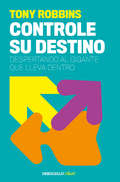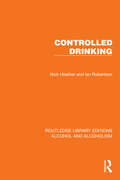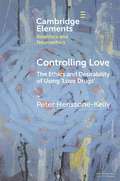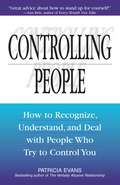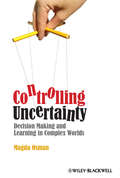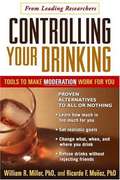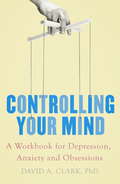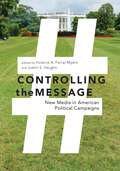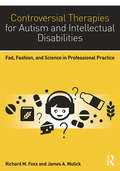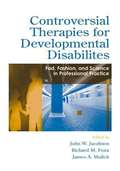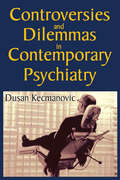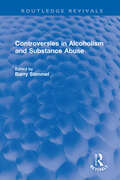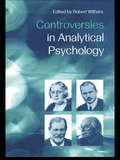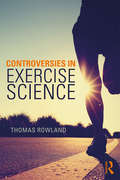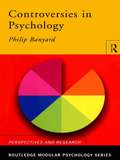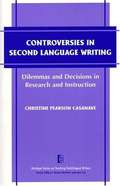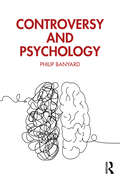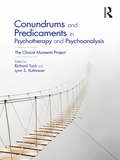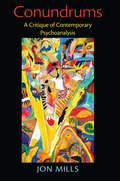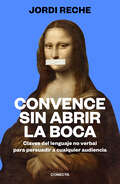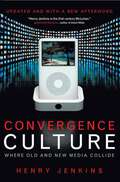- Table View
- List View
Controle su destino: Despertando el gigante que lleva dentro
by Anthony RobbinsUn viaje de autodescubrimiento cuya estación final es la más plena y satisfactoria realización de uno mismo. ¿Se deja arrastrar por circunstancias que parecen estar fuera de su control? Esa carencia de autodominio es consecuencia de múltiples factores: hábitos negativos, escaso conocimiento de los propios valores personales, dificultades en las relaciones con los demás... Todo ello causa esa angustiosa sensación de estar manejado por los otros, por «lo» otro. En Controle su destino, Anthony Robbins propone una serie de pautas sencillas de seguir que nos ayudan a descubrir nuestras creencias más profundas, nuestras preguntas fundamentales. Los lectores han dicho...«Impresionante. Leer sí o sí. Top10 de los últimos 100 que he leído. Libro de referencia. Recomendadísimo en todos los sentidos.» «Un maravilloso libro para "controlar tu destino". Aporta información y herramientas útiles para aplicar en tu vida y para aplicar en sesiones de coaching personal» «Si te gusta leer libros de autoayuda este, para mí, es EL LIBRO.»
Controlled Drinking (Routledge Library Editions: Alcohol and Alcoholism)
by Ian Robertson Nick HeatherOriginally published in 1981 and revised in 1983, Controlled Drinking was the first scholarly review of the literature on a controversial but increasingly practiced approach to the treatment of alcoholism. Nick Heather and Ian Robertson analyse all the pertinent questions that controlled drinking raises, starting with the need to examine the ‘disease conception’ of alcoholism and ‘total abstinence’ treatment. They look at the evidence indicating that some people, previously diagnosed as alcoholics, are able to return to normal, controlled patterns of drinking, and discuss therapies where controlled drinking is the treatment goal, fully reviewing the evidence for their success and failure. Concluding with a discussion of the theoretical and policy implications of controlled drinking, the authors recommend that the disease view of alcoholism be finally abandoned. For the revised paperback edition, as well as correcting and updating the text and references, the authors included an important postscript on the charges of falsification of evidence and their subsequent refutation which made up the Sobell affair. The wealth of other material presented in Controlled Drinking supports the authors’ conclusions even if the Sobells’ work were ignored. However, this revised edition was made more useful for student and professional readers by the postscript’s discussion of the controversy surrounding the most widely known and quoted controlled drinking trial at the time.
Controlling Love: The Ethics and Desirability of Using ‘Love Drugs' (Elements in Bioethics and Neuroethics)
by Peter Herissone-KellyRecent research in neurochemistry has shown there to be a number of chemical compounds that are implicated in the patterns of lust, attraction, and attachment that undergird romantic love. For example, there is evidence that the phenomenon of attachment is associated with the action of oxytocin and vasopressin. There is therefore some reason to suppose that patterns of lust, attraction, and attachment could be regulated via manipulation of these substances in the brain: in other words, by their use as 'love drugs'. A growing bioethical literature asks searching questions about this prospect, and especially about the use of such drugs to enhance or reignite attachment in flagging relationships. This Element examines some of the central arguments on the topic, and sounds a note of caution. It urges that there are reasons to think the states of attachment produced or facilitated by the use of such drugs would not be desirable.
Controlling People: How to Recognize, Understand, and Deal With People Who Try to Control You
by Patricia EvansLearn how to &“break the spell&” of control with this bestseller hailed by Oprah Winfrey. Controlling People reveals the thought processes of those who try to control others and provides a &“spell-breaking&” mind-set for those who suffer this insidious manipulation.Does this sound like someone you know? *Always needs to be right *Tells you who you are and what you think *Implies that you&’re wrong or inadequate when you don&’t agree *Is threatened by people who are &“different&” *Feels attacked when questioned *Doesn&’t seem to really hear or see you If any of the above traits sounds familiar, help is on the way! In Controlling People, bestselling author Patricia Evans, tackles the &“controlling personality,&” and reveals how and why these people try to run other people&’s lives. She also explains the compulsion that makes them continue this behavior—even as they alienate others and often lose those they love. Controlling People helps you unravel the senseless behavior that plagues both the controller and the victim. Can the pattern or spell be broken? YES, says the author. By understanding the compelling force involved, you can be a catalyst for change and actually become a spell-breaker. Once the spell is broken and the controller sees others as they really are, a genuine connection can be forged and healing can occur. Should you ever find yourself in the thrall of someone close to you, Controlling People is here to give you the wisdom, power, and comfort you need to be a stronger, happier, and more independent person.
Controlling Uncertainty: Decision Making and Learning in Complex Worlds
by Magda OsmanControlling Uncertainty: Decision Making and Learning in Complex Worlds reviews and discusses the most current research relating to the ways we can control the uncertain world around us. Features reviews and discussions of the most current research in a number of fields relevant to controlling uncertainty, such as psychology, neuroscience, computer science and engineering Presents a new framework that is designed to integrate a variety of disparate fields of research Represents the first book of its kind to provide a general overview of work related to understanding control
Controlling Your Drinking: Tools to Make Moderation Work for You
by Ricardo F. Murioz William R. MillerAn easy-to-read guide to moderate drinking.
Controlling Your Mind: A Workbook for Depression, Anxiety and Obsessions
by David A. Clark PhDStop disruptive, negative thoughts at their root with a new method of mental control from one of the most distinguished figures in the field of CBTOur mind is always active, capable of generating free-floating thoughts that are entirely disconnected from each other and may have little relevance to our current situation. Sometimes these thoughts take on a darker, more negative tone because they're triggered by a stressful or problematic situation. These unwanted intrusive thoughts play an important role in the persistence and severity of anxiety and depression. They often trigger other forms of distressing thought such as obsessive thinking, worry, rumination or pathological guilt. Based on new findings on the nature of mental control, this book targets negative, intrusive thoughts with therapeutic strategies based on cognitive behavioural therapy (CBT). You will learn:· How our minds become unsettled by doubts and unwanted thoughts· Strategies for developing greater willpower and self-control· Control skills for self-discovery, mental de-toxification and mindful self-acceptance· Way to maximise positive intrusions and be mindfully accepting of yourselfPublished by New Harbinger in the USA under the title The Anxious Thoughts Workbook: Skills to Overcome the Unwanted Intrusive Thoughts that Drive Anxiety, Obsessions and Depression
Controlling the Message: New Media in American Political Campaigns
by Justin S. Vaughn Victoria A. Farrar-MyersChoice Outstanding Academic Title of 2016From the presidential race to the battle for the office of New York City mayor, American political candidates’ approach to new media strategy is increasingly what makes or breaks their campaign. Targeted outreach on Facebook and Twitter, placement of a well-timed viral ad, and the ability to roll with the memes, flame wars, and downvotes that might spring from ordinary citizens’ engagement with the issues—these skills are heralded as crucial for anyone hoping to get their views heard in a chaotic election cycle. But just how effective are the kinds of media strategies that American politicians employ? And what effect, if any, do citizen-created political media have on the tide of public opinion? In Controlling the Message, Farrar-Myers and Vaughn curate a series of case studies that use real-time original research from the 2012 election season to explore how politicians and ordinary citizens use and consume new media during political campaigns. Broken down into sections that examine new media strategy from the highest echelons of campaign management all the way down to passive citizen engagement with campaign issues in places like online comment forums, the book ultimately reveals that political messaging in today’s diverse new media landscape is a fragile, unpredictable, and sometimes futile process. The result is a collection that both interprets important historical data from a watershed campaign season and also explains myriad approaches to political campaign media scholarship—an ideal volume for students, scholars, and political analysts alike.
Controversial Therapies for Autism and Intellectual Disabilities: Fad, Fashion, and Science in Professional Practice
by James A. Mulick Richard M. FoxxOne of the largest and most complex human services systems in history has evolved to address the needs of people with autism and intellectual disabilities, yet important questions remain for many professionals, administrators, and parents. What approaches to early intervention, education, treatment, therapy, and remediation really help those with autism and other intellectual disabilities improve their functioning and adaptation? Alternatively, what approaches represent wastes of time, effort, and resources? <p><p>Controversial Therapies for Autism and Intellectual Disabilities, 2nd Edition brings together leading behavioral scientists and practitioners to shed much-needed light on the major controversies surrounding these questions. Expert authors review the origins, perpetuation, and resistance to scrutiny of questionable practices, and offer a clear rationale for appraising the quality of various services. <p><p>The second edition of Controversial Therapies for Autism and Intellectual Disabilities has been fully revised and updated and includes entirely new chapters on psychology fads, why applied behavioral analysis is not a fad, rapid prompting, relationship therapies, the gluten-free, casein-free diet, evidence based practices, state government regulation of behavioral treatment, teaching ethics, and a parents' primer for autism treatments.
Controversial Therapies for Developmental Disabilities: Fad, Fashion, and Science in Professional Practice
by James A. Mulick Richard M. Foxx John W. JacobsonOne of the largest and most complex human services systems in Western nations has evolved to address the needs of people with developmental disabilities. In the U. S. , for example, school budgets are stretched thin by legally mandated special education, and billions of Medicaid dollars annually are consumed by residential and professional services to this population. The temptation of a quick fix is strong. Many parents desperately seek the latest ideas and place pressure on program administrators, who often are not trained to think critically about the evidence base for intervention efforts. The problems of people with developmental disabilities have historically been targeted by a wide range of professionals who rely on clinical experience and intuition and do not submit their claims to the tests of scientific research. Professional entrepreneurs have energetically promoted their treatments to a public perhaps too trustful of those with credentials. Thus, families and their children are buffeted by reforms founded on belief and ideologically driven management. Services fluctuate with the currents of social movements and rapidly shifting philosophies of care as policymakers and providers strive for increased responsiveness and individualization. These forces affect not only where and how, but how well people are served. Too often, services are less effective than they could be, or worse, damaging to personal growth and quality of life. Many treatments are based on poorly understood or even disproven approaches. What approaches to early intervention, education, therapy, and remediation really help those with mental retardation and developmental disabilities improve their functioning and adaptation? And what approaches represent wastes of time, effort, and resources? This book brings together leading behavioral scientists and practitioners to focus light on the major controversies surrounding these questions. The authors review the origins, perpetuation, and resistance to scrutiny of questionable practices, and offer a clear rationale for appraising the quality of services. In an era of increasing accountability, no one with a professional stake in services to individuals with mental retardation and developmental disabilities can afford not to read this book.
Controversies and Dilemmas in Contemporary Psychiatry
by Dusan KecmanovicThe controversies and dilemmas in contemporary psychiatry are so numerous and serious that they, to a great extent, define psychiatry. Yet most psychiatrists pay little attention to the field's controversies, maintaining that talking about controversies tarnishes psychiatry's reputation and them along with it. Critics of psychiatry use these controversies and dilemmas, along with psychiatrists' unwillingness to discuss them, to undermine psychiatry. They question the existence of mental disorder and the purpose of psychiatric therapy. Kecmanovic undertakes a major effort of resolving with science, not ideology, such dilemmas.Although psychiatrists give no thought to the mind-body relationship, their attitude towards this relationship determines their approach to the mentally ill, their understanding of the origin and nature of the mental disorder, and the therapy they think has priority. Sometimes psychiatrists implicitly or explicitly cite a specific school of philosophy in order to find conceptual support for their particular practice. As a result psychiatrists do not speak the same language about the same issues. Kecmanovic suggests that there can be no dialogue without common language; opposing views cannot converge without dialogue.The behavior of the mentally ill is socially jarring. This is a major reason why the mentally ill are considered to be a menace. They threaten prevailing manners of communicating, expressing one's thoughts and feelings, and the existing meaning of symbols in a given environment. Deviance of a person with a mental disorder is specific; socially perceived as incomprehensible, irrational, and unpredictable. What is common to all reactions to the disruptive nature of a mental disorder is the desire to be protected from those with illness; in other words, to put them under control and supervision.
Controversies in Alcoholism and Substance Abuse (Routledge Revivals)
by Barry StimmelFirst published in 1986, Controversies in Alcoholism and Substance Abuse presents a collection of papers dealing with various aspects of alcohol and substance abuse. It covers crucial themes like -1) the Acquired Immune Deficiency Syndrome and heroin addiction; 2) the effects of widespread cocaine use; 3) social use of marijuana; 4) early identification of and efficacy of treatment for alcoholism; and 5) the effects of social drinking during pregnancy on the fetus. This book will be of interest to scholars and researchers of addiction studies, psychology, sociology of addiction and specially those who wants to know about the advances made in the 1980s in the study of alcohol and substance abuse.
Controversies in Analytical Psychology
by Robert WithersHow can controversy promote mutual respect in analytical psychology?Analytical psychology is a broad church, and influences areas such as literature, cultural studies, and religion. However, in common with psychoanalysis, there are many different schools of thought and practice which have resulted in divisions within the field. Controversies in Analytical Psychology picks up on these and explores many of the most hotly contested issues in and around analytical psychology.A group of leading international Jungian authors have contributed papers from contrasting perspectives on a series of key controversies. Some of these concern clinical issues such as what helps patients get better, or how closely analysts should work with the transference. Other contributions focus on the relationship between analytical psychology and other disciplines including evolutionary theory, linguistics, politics and religion. A critical eye is cast over Jungian theories and practices, and a number of questions are raised:* are they homophobic?* do they denigrate women?* do they confuse absolute with narrative truth?* are the frequency of sessions chosen for political rather than clinical reasons?Controversies in Analytical Psychology encourages critical thinking on a variety of issues, helping foster dialogue and investigation in a climate of mutual respect and understanding. It will be invaluable for Jungian analysts and psychoanalysts in training and practice and psychotherapists.
Controversies in Exercise Science
by Thomas RowlandControversies in Exercise Science introduces a series of selected unresolved issues in the field of human exercise science. The common thread to all of these topics is that, in their ultimate resolution, they offer promise of insights into the essential principles of physiological systems and how these respond to the stresses of exercise. Each case study includes an examination of research surrounding each issue; the innovative aspect, however, will be that each of these controversies will be presented in the context of an historical and/or philosophical perspective. These chapter include topics related to basic exercise physiology, sports, physical activity, and exercise health. Underlying each of these debates lie clues which may offer insights into the basic nature of living beings. Aimed at both academics and practitioners in the fields of exercise science, biology, and related sports science disciplines, Controversies in Exercise Science provides arguments for both sides of several selected contemporary controversies in the field of exercise science and, while no ultimate resolution will be provided, the goal is, rather, to offer the reader sufficient "raw material" on which he or she might make their own judgement on the matters presented.
Controversies in Psychology (Routledge Modular Psychology)
by Phil BanyardAn introduction to the areas that have been studied in psychology that have excited controversy, including advertising, psychometric testing, propoganda and warfare.
Controversies in Schizophrenia: Issues, Causes, and Treatment
by Michael FarrellExamining timely debates around contentious topics in schizophrenia, Controversies in Schizophrenia demonstrates that while some criticisms of psychiatry are pertinent, many are flawed. Drawing on diverse sources including personal accounts of people with schizophrenia, reports, and psychiatric guidance, this book conceptualises schizophrenia in the context of other psychotic disorders, in order that the condition may be understood better. Key topics covered include antipsychotic medication, a biopsychosocial view, stigma, implications of schizophrenia as an illness, brain anomalies, and neurochemical factors. This book is essential for mental health professionals working regularly with people with psychosis, including psychiatrists, psychiatric residents, psychologists, nurses, and social workers.
Controversies in Second Language Writing: Dilemmas and Decisions in Research and Instruction
by Christine Pearson CasanaveControversies in Second Language Writing is not a how-to book, but one that focuses on how teachers in L2 writing can be helped to make reasoned decisions by understanding some of the key issues and conflicting opinions about L2 writing research and pedagogy. This book will assist teachers in making informed decisions about teaching writing in the ESL classroom. To counteract some of the debates, Casanave explores the different sides of the arguments and provides examples of how other teachers have dealt with these issues. The book presents novice and seasoned teachers with thought-provoking issues and questions to consider when determining and reflecting on their own teaching strategies and criteria. Topics discussed include: contrastive rhetoric product vs. process fluency and accuracy assessment of student work audience plagiarism politics and ideology.
Controversy and Psychology
by Philip BanyardControversy and Psychology examines a range of areas studied in psychology which have sparked controversy, encouraging readers to think critically about the research they engage with in order to develop their own opinions by recognising biases in this discipline. Author Phil Banyard investigates the popular, mainstream subject of psychology through a critical eye, presenting a researched account of how the discipline, practice, research methods, and theories of psychology have focused on a narrow group of people and in so doing brought harm to others. The controversies addressed in the text include methods in psychology, the history and ongoing acceptance of racism in psychology, the categorisation and quantification of people, the excessive and unhelpful use of diagnostic categories, the involvement of psychologists in warfare, and finally the role of psychologists in persuasive messaging. This illuminating text explores the history of these controversies and highlights how they continue to affect the profession and its interactions with people. Controversy and Psychology is an essential read for undergraduate and pre-undergraduate students studying psychology and for anyone in related fields looking to gain a broader knowledge of the more contentious aspects of the discipline and enhance their critical thinking skills. Professionals and researchers looking to re-examine their working methods can also benefit from the book.
Conundrums and Predicaments in Psychotherapy and Psychoanalysis: The Clinical Moments Project
by Richard Tuch Lynn S. KuttnauerFrom time to time therapists find themselves in a bind—faced with a challenging situation, unsure how to proceed. Such a conundrum leaves the therapist on edge, concerned that the success of treatment might rest on how he or she responds to the circumstance. The situation seems to call for more than pat clinical protocol, leaving the therapist uncertain as he or she ventures into novel territory wondering "what do I do now?" Conundrums and Predicaments in Psychotherapy and Psychoanalysis: The Clinical Moments Project comprises twelve distinct clinical moments during which the treating/presenting analyst feels him- or herself in just such a quandary. The presented moment comes to a head at a point where the therapist feels uncertain what his or her next and best "move" might be—one that balances the protection of the therapeutic alliance with the need to address a clinical development head on. Space is then left for 25 well-known analysts ("commentators") of varying theoretical persuasions to weigh in, sharing what they think about the situation and how they imagine they might have proceeded. In the final analysis, the point of this project is not to determine how the moment "should" have been handled given the input of experts; rather, it aims to illuminate the clinical theories that therapists carry with them into sessions where they operate implicitly, directing their attention to select sorts of data that are then used to fashion an intervention. This, then, is the ultimate lesson of the Clinical Moments Project—to learn how to listen to how therapists listen to the unfolding material. This book will be of great interest to psychoanalysts and psychoanalytic psychotherapists of all persuasions.
Conundrums: A Critique of Contemporary Psychoanalysis
by Jon Mills2013 Goethe Award Winner! This is the first book of its kind to offer a sustained critique of contemporary psychoanalytic thought favoring relational, postmodern, and intersubjective perspectives, which largely define American psychoanalysis today. Conundrums turns an eye toward the philosophical underpinnings of contemporary theory; its theoretical relation to traditional psychoanalytic thought; clinical implications for therapeutic practice; political and ethical ramifications of contemporary praxis; and its intersection with points of consilience that emerge from these traditions. Central arguments and criticisms advanced throughout the book focus on operationally defining the key tenets of contemporary perspectives; the seduction and ambiguity of postmodernism; the question of selfhood and agency; illegitimate attacks on classical psychoanalysis; the role of therapeutic excess; contemporary psychoanalytic politics; and the question of consilience between psychoanalysis as a science versus psychoanalysis as part of the humanities. The historical criticisms against psychoanalysis are further explored in the context of the current philosophical-scientific binary that preoccupies the field.
Convence sin abrir la boca: Claves del lenguaje no verbal para persuadir a cualquier audiencia
by Jordi RecheDescubre las claves del lenguaje no verbal para cautivar y persuadir a cualquier audiencia y en cualquier situación. En el entorno personal y profesional, nuestros gestos, miradas, posturas, sonrisas... dicen más de nosotros que las palabras que pronunciamos. Porque el lenguaje del cuerpo es revelador: cómo nos sentamos, cómo caminamos, cómo saludamos..., todo comunica. Los demás interpretan y recuerdan nuestros mensajes por lo que transmitimos a nivel visual mucho más que por lo que decimos. Pero ¿sabes qué expresas con tu cuerpo? Jordi Reche te descubre los secretos del lenguaje no verbal: qué significa cada gesto, por qué lo haces y cómo interpretarlo tanto en ti mismo como en los demás. Convence sin abrir la boca te proporciona las herramientas para dominar el lenguaje corporal y conectar con tus interlocutores. Aprende a utilizarlas para ser más convincente y persuasivo, transmitir mayor seguridad y confianza, y ganar influencia entre quienes te rodean. En este libro aprenderás: * A comunicar mejor, reforzando tu mensaje hablado con tu gestualidad. * A tener mayor consciencia de tu cuerpo y a utilizarlo para sentirte mejor y para que, quienes te rodean, te vean mejor. * A leer en los gestos de los demás información que han decidido no darte u ocultarte, o simplemente a descifrar que te están mintiendo.* A descubrir que tu poder de persuasión puede aumentar de manera significativa si cuidas tu lenguaje no verbal de líder. * A conocer mejor los mensajes que envían tus fotos de perfil, tus fotos grupales o los vídeos que cuelgas en las redes. * A detectar las emociones reales de una persona, más allá de lo que nos cuente con sus palabras. * A aumentar tu capacidad de seducción y a leer en el cuerpo de las personas con las que te relacionas si estás atrayendo su atención de manera positiva o no. Reseñas:«Con el libro de Jordi puedes aprender tanto a leer a los demás como a mejorar tu comunicación de una forma amena y entretenida. Puedes usarlo siempre que quieras para mejorar y llevar tu comunicación y conocimiento a otro nivel que no muchos conocen».Jose Fernández @soycriminologo. Experto en criminología y comportamiento no verbal«Jordi ha condensado en un libro una gran cantidad de trucos y técnicas para entender cómo funciona la comunicación no verbal. Esto permite que lo apliques es muchos ámbitos: en negociaciones, ventas, formaciones... Es un manual didáctico y directo que te ayudará a iniciarte de lleno en el apasionante mundo de la comunicación».Fernando Miralles. Formador y divulgador experto en oratoria«Jordi te explica paso a paso todo lo que cualquier comunicador debería saber, ya sea hablando con un cliente o frente a miles de espectadores. Sin duda, una caja de herramientas que todo profesional debería leer. Un título obligatorio para cualquiera que desee destacarse en su carrera».Nico Fernández Miranda. Empresario, conferencista y profesor universitario«En este mundo tan expeditivo Jordi nos enseña no solo cómo mejorar nuestro lenguaje corporal sino también cómo leer a quienes tenemos enfrente, esto nos ayudara luego a complementar nuestro objetivo final en una reunión o quizás en esa charla incomoda que tanto evadimos. Aquí aprenderás cómo congeniar eso que quieres decir no solo con palabras si no con todo tu cuerpo».Evelina Cabrera. Entrenadora de fútbol, coach deportivo y escritora
Convergence Culture: Where Old and New Media Collide
by Henry JenkinsWinner of the 2007 Society for Cinema and Media Studies Katherine Singer Kovacs Book Award2007 Choice Outstanding Academic TitleA classic study on the dynamic between an individual and different media channels Convergence Culture maps a new territory: where old and new media intersect, where grassroots and corporate media collide, where the power of the media producer and the power of the consumer interact in unpredictable ways.Henry Jenkins, one of America’s most respected media analysts, delves beneath the new media hype to uncover the important cultural transformations that are taking place as media converge. He takes us into the secret world of Survivor Spoilers, where avid internet users pool their knowledge to unearth the show’s secrets before they are revealed on the air. He introduces us to young Harry Potter fans who are writing their own Hogwarts tales while executives at Warner Brothers struggle for control of their franchise. He shows us how The Matrix has pushed transmedia storytelling to new levels, creating a fictional world where consumers track down bits of the story across multiple media channels.Jenkins argues that struggles over convergence will redefine the face of American popular culture. Industry leaders see opportunities to direct content across many channels to increase revenue and broaden markets. At the same time, consumers envision a liberated public sphere, free of network controls, in a decentralized media environment. Sometimes corporate and grassroots efforts reinforce each other, creating closer, more rewarding relations between media producers and consumers. Sometimes these two forces are at war.Jenkins provides a riveting introduction to the world where every story gets told and every brand gets sold across multiple media platforms. He explains the cultural shift that is occurring as consumers fight for control across disparate channels, changing the way we do business, elect our leaders, and educate our children.
Convergence of Ergonomics and Design: Proceedings of ACED SEANES 2020 (Advances in Intelligent Systems and Computing #1298)
by Ravindra S. Goonetilleke Alma Maria Jennifer Gutierrez Rex Aurellius C. RobielosThis book presents the proceedings of the Joint Conference of the Asian Council on Ergonomics and Design and Southeast Asian Network of Ergonomics Societies (ACED SEANES), held on December 2-4, 2020. By highlighting the latest theories and models, as well as cutting-edge technologies and applications, and by combining findings from a range of disciplines including engineering, design, robotics, healthcare, management, computer science, human biology and behavioral science, it provides researchers and practitioners alike with a comprehensive, timely guide on human factors and ergonomics. It also offers an excellent source of innovative ideas to stimulate future discussions and developments aimed at applying knowledge and techniques to optimize system performance, while at the same time promoting the health, safety and wellbeing of individuals. The proceedings include papers from researchers and practitioners, scientists and physicians, institutional leaders, managers and policy makers that contribute to constructing the Human Factors and Ergonomics approach across a variety of methodologies, domains and productive sectors.
Conversaciones con Dios 3
by Neale Donald WalschSiga disfrutando de una experiencia extraordinaria con la serie bestseller "Conversaciones con Dios", una trilogía que contiene verdades esenciales y lecciones para aquellos interesados en la búsqueda espiritual.Conversaciones con Dios III, el último volumen de la trilogía, conmoverá a muchos lectores.En este último libro Neale Donald Walsch sintetizan las enseñanzas anteriores y expone la conclusión lógica y asombrosa de una experiencia extraordinaria, de un diálogo pleno de comprensión y amor. El diálogo concluye como se inició. Al igual que la vida, completa un ciclo. Ahora sólo queda pendiente una pregunta... ¿quién escucha?"No se trata de un libro escrito por mí, sino que me ha ocurrido a mí" -Neale Donald Walsch-
Conversaciones sexuales con mi abuela: Una divertida guía de mindfulsex para todos
by Ana SierraUn libro con el que descubrir tu sexualidad, desterrar mitos y creencias sin fundamento, conocer mejor tu cuerpo y aprender a disfrutar de tus relaciones sexuales. Hoy en día tenemos a nuestro alcance numerosa información sobre sexualidad, pero no siempre es adecuada (o simplemente no recurrimos a ella). Gracias a la complicidad y al desparpajo de su abuela, la sexóloga Ana Sierra nos aclara numerosas dudas y tabúes que se mantienen a pesar del paso de los años. Con un estilo desenfadado y riguroso, la autora nos transmite sin tapujos gran cantidad de claves para entendernos mejor a nosotros mismos y a los demás porque, contrariamente a lo que habitualmente creemos, la sexualidad está en todo y nos acompaña a todas partes. De manera que, en las distintas situaciones a las que nos enfrentamos cada día, hagamos el amor y mantengamos relaciones sexuales, pero, eso sí, de manera muy consciente.
